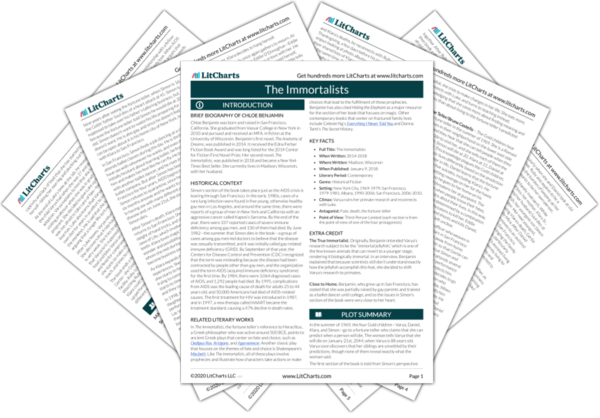HIV/AIDS Quotes in The Immortalists
In New York, he would live for them, but in San Francisco, he could live for himself. And though he does not like to think about it, though he in fact avoids the subject pathologically, he allows himself to think it now: What if the woman on Hester Street is right? The mere thought turns his life a different color; it makes everything feel urgent, glittering, precious.
Robert paces the apartment. “We need to stay here,” he says. They have enough food for two weeks. Neither of them has slept in days.
But Simon is panicked by the thought of quarantine. He already feels cut off from the world, and he refuses to hide, refuses to believe this is the end. He’s not dead yet. And yet he knows, of course he knows, or at least he fears—the thin line between fear and intuition; how one so easily masquerades as the other—that the woman is right, and that by June 21st, the first day of summer, he’ll be gone, too.
“I wish—I wish…”
“Don’t wish it. Look what she gave me.”
“This!” says Klara, looking at the lesions on his arms, his sharp ribs. Even his blond mane has thinned: after an aide helps him bathe, the drain is matted with curls.
“No,” says Simon, “this,” and he points at the window. “I would never have come to San Francisco if it weren’t for her. I wouldn’t have met Robert. I’d never have learned how to dance. I’d probably still be home, waiting for my life to begin.”
“The thought that you could die from sex,” Varya says, haltingly. “You weren’t terrified?”
“No, not then. Because it didn’t feel that way. When doctors said we should be celibate, it didn’t feel like they were telling us to choose between sex and death. It felt like they were asking us to choose between death and life. And no one who worked that hard to live life authentically, to have sex authentically, was willing to give it up.”












